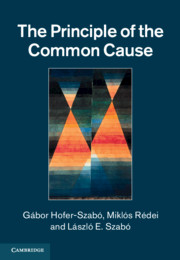Book contents
- Frontmatter
- Contents
- Preface
- 1 Introduction and overview
- 2 The Common Cause Principle
- 3 Common cause extendability of probability spaces
- 4 Causally closed probability theories
- 5 Common common causes
- 6 Common cause extendability of nonclassical probability spaces
- 7 Reichenbachian common cause systems
- 8 Causal closedness of quantum field theory
- 9 Reichenbach's Common Cause Principle and EPR correlations
- 10 Where do we stand?
- Appendix
- References
- Index
2 - The Common Cause Principle
Published online by Cambridge University Press: 05 June 2013
- Frontmatter
- Contents
- Preface
- 1 Introduction and overview
- 2 The Common Cause Principle
- 3 Common cause extendability of probability spaces
- 4 Causally closed probability theories
- 5 Common common causes
- 6 Common cause extendability of nonclassical probability spaces
- 7 Reichenbachian common cause systems
- 8 Causal closedness of quantum field theory
- 9 Reichenbach's Common Cause Principle and EPR correlations
- 10 Where do we stand?
- Appendix
- References
- Index
Summary
Reichenbach's notion of common cause
In what follows (X, S, p) denotes a classical Kolmogorovian probability space with Boolean algebra S of subsets of a set X (with respect to the set theoretic operations ∩, ∪ and A⊥ = X\A as Boolean algebra operations) and with the probability measure p on S. (See the Appendix for a concise review of the basic concepts of measure theoretic probability theory.) Elements of S are called random events (elements of X are sometimes called (random) elementary events). It is common to assume in probability theory that p is a countably additive (also called σ-additive) and not just a finitely additive measure but the assumption of countable additivity is somewhat controversial in the philosophical literature. The distinction between countable and finite additivity will not play any role in Chapters 3–5, 7 and 9: the results presented are valid under the assumption of either finite or countable additivity. Countable additivity will play a role in Chapters 6 and 8, however, where the problem of correlations in nonclassical (quantum) probability spaces will be investigated, and where the quantum counterpart of p will be assumed to be countably additive (“normal” in the terminology of the theory von Neumann algebras).
If S has a finite number of elements, then it is the power set P(X)of a set X having n < ∞ elements denoted by ai (i = 1, 2 …n); in this case we write Sn.
- Type
- Chapter
- Information
- The Principle of the Common Cause , pp. 11 - 17Publisher: Cambridge University PressPrint publication year: 2013



